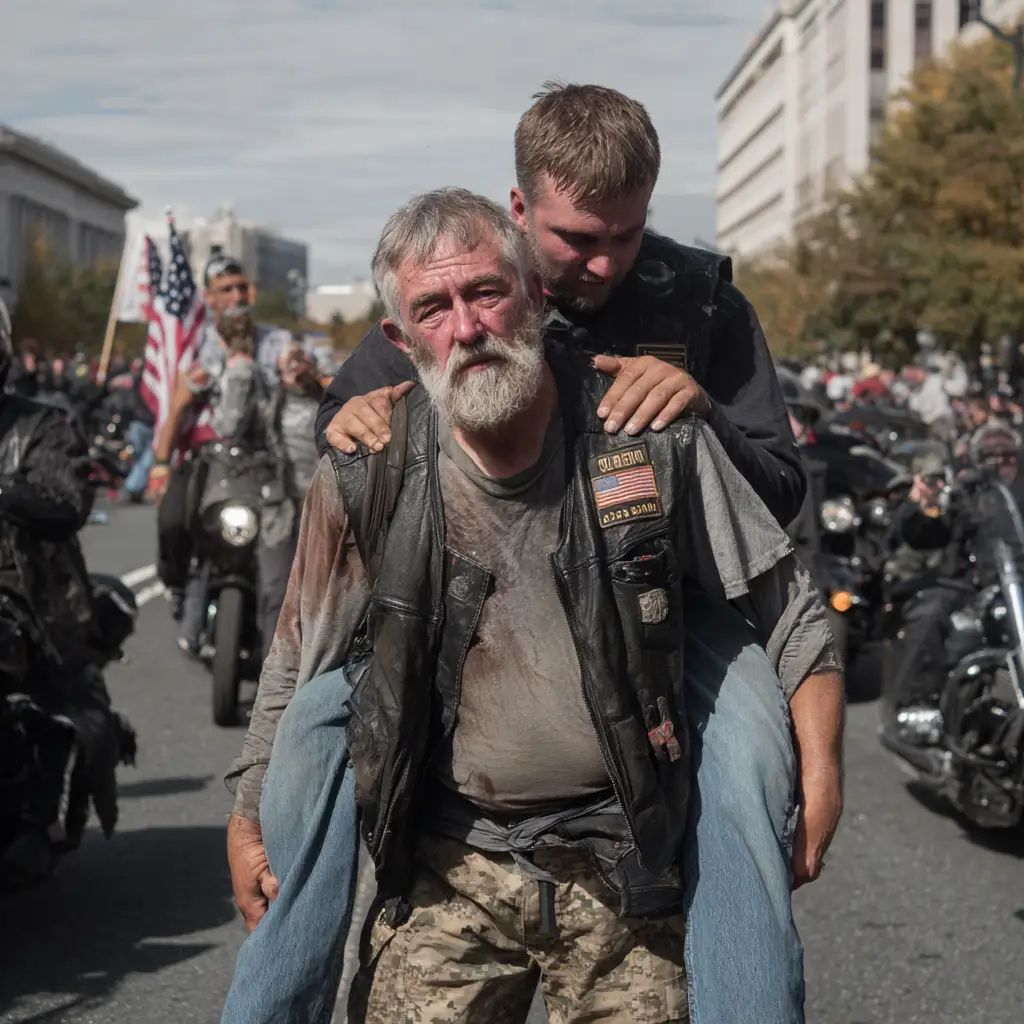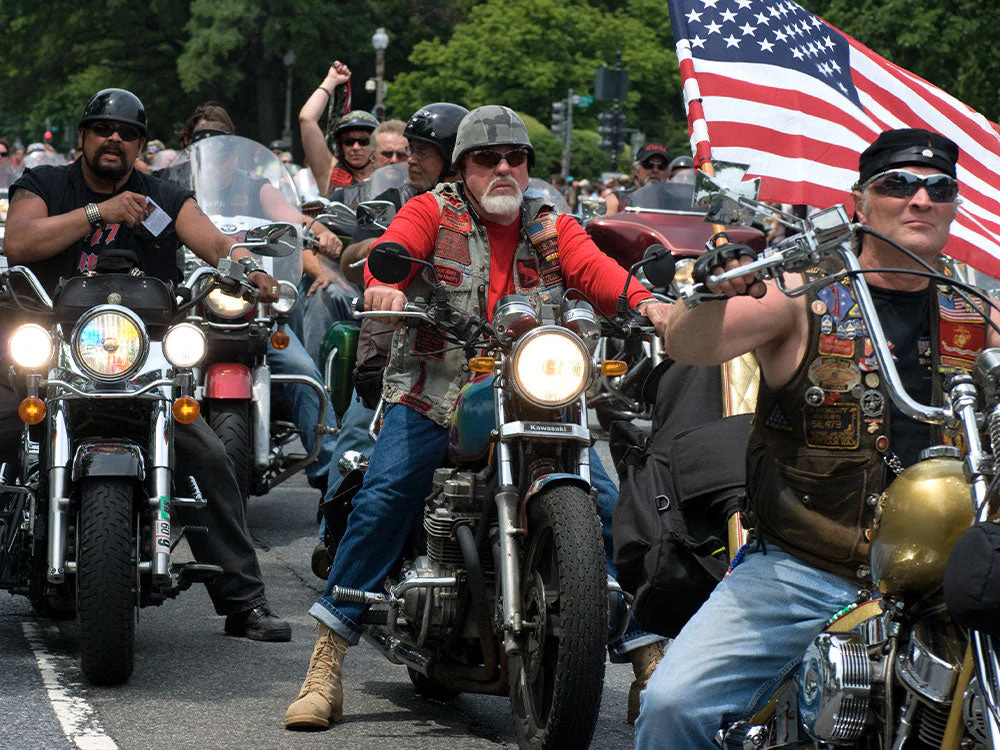The Day Brotherhood Carried America
Every Veterans Day, thousands gather to wave flags, play music, and honor those who served. But in one small city, a single act of brotherhood turned a parade into a lesson the entire nation would never forget. When the city refused to make the parade route accessible for a paralyzed veteran, one old biker decided to carry him—literally—on his back for three miles. What followed was a moment of raw humanity that redefined what it means to never leave a brother behind.
The Refusal That Sparked a Revolution
It started with a quiet conversation at the American Legion hall. Twenty-six-year-old Tyler Brooks, a veteran of Afghanistan, rolled his wheelchair into a meeting of the Combat Veterans Motorcycle Club. He’d lost both legs to an IED two years earlier and had spent those years fighting not just his injuries but also indifference.

“I want to march in the Veterans Day parade,” he said. “My grandpa marched after World War II. My dad after Vietnam. I just want my turn.”
But the city denied his request. The old cobblestone streets weren’t wheelchair accessible, they said. Temporary ramps would cost forty thousand dollars—too much for the budget. The mayor reportedly told him, “If he can’t walk the route like everyone else, maybe he shouldn’t participate.”
The words hung heavy. But Jim “Tank” Morrison, a six-foot-three Vietnam veteran with bad knees and a heart made of steel, stood up from his chair and growled, “No brother gets left behind. Not today. Not ever.”
The Plan That No One Saw Coming
Tank wasn’t about to let bureaucracy decide who could honor their fallen brothers. Two weeks before the parade, he started training—stretching, strengthening, and preparing to carry Tyler the entire route on his back.
The other members of the Combat Veterans MC offered to take turns. “Three miles, fifteen of us—that’s a quarter mile each,” said Buck, the club’s sergeant-at-arms.
But Tank refused. “He’s my brother. I’ll carry him the whole damn way.”
What the mayor didn’t know was that Tank’s helmet cam would capture every word, every mile, and every tear.
Video : Biker Helps Cop Then Gets Pulled Over
The Morning of the Parade
November 11th dawned crisp and clear. The streets buzzed with excitement, though not everyone knew what was about to unfold. Tyler arrived in his dress uniform, medals shining, nerves visible in his eyes.
Tank met him in full leather vest, patches gleaming from decades of service. Without ceremony, he knelt down and said, “Climb on, son. We march together.”
Tyler hesitated. “Tank, you can’t—your knees—”
“My knees survived Vietnam,” Tank replied. “They can handle this.”
As the parade began, bands played, flags waved, and then came the sight that silenced the crowd: a burly, gray-bearded biker carrying a young soldier on his back, both in full uniform, surrounded by a wall of veterans marching in perfect formation.
The Moment That Stopped a City
At first, people didn’t understand what they were seeing. Then the truth spread like wildfire. The crowd’s cheers grew louder. Children saluted. Strangers wept openly.
Tank’s steps were steady but heavy. His knees trembled, but his spirit didn’t. Tyler whispered encouragements between breaths. “You’re doing it, Tank. You’re doing it.”
“They’re not just watching us, son,” Tank said through gritted teeth. “They’re remembering what we stand for.”

At the halfway mark, the pain became unbearable. Tank’s legs buckled. His club brothers tried to take over, but he shook his head. “Not yet.”
By the two-mile point, the mayor himself appeared at the reviewing stand, red-faced and furious. He stepped into the street and barked, “This ends now. You’re turning this into a spectacle!”
Tank stopped in front of him, crowd cameras rolling. “A spectacle? This man lost his legs for your freedom. You told him he didn’t belong. You said if he can’t walk, he can’t honor his country. Well, I say he walks today—on my back if he has to!”
The crowd erupted into chants. “Let them march! Let them march!” The mayor backed away, defeated.
When the People Joined In
By the final stretch, Tank’s legs gave out completely. He dropped to one knee, gasping, refusing to let Tyler fall. The crowd broke through the barriers. Teenagers grabbed his arms, elderly women steadied his shoulders, and together, they lifted him up.
“We’ve got you,” one young man said.
The last half mile wasn’t just Tank and Tyler anymore—it was the whole town. Civilians, veterans, and children walked beside them. People cried, saluted, and cheered through tears. When they crossed the finish line, Tank collapsed, exhausted but smiling.
“We made it, son,” he whispered.
Tyler’s eyes glistened. “You could’ve killed yourself, Tank. Why’d you do it?”
Tank gripped his hand tightly. “Because too many of us die thinking no one cares. Because you needed to know someone would carry you if you couldn’t. Because that’s what brotherhood means.”
The Aftermath: When the Nation Took Notice
The footage from Tank’s helmet cam went viral within hours. #CarryThemAll began trending across social media. News anchors replayed the moment the mayor was called out. Veterans across the country shared stories of being ignored or excluded, and for once, people listened.
Within days, the mayor resigned. Within weeks, new legislation was proposed to ensure all Veterans Day parades receiving federal funding must be fully accessible to disabled veterans.
Video : Giving Lift To Strangers | Biker Helping Peoples | Hill Rider
But the most profound change came at home. The city overhauled its parade route, installing permanent accessibility ramps. Local businesses began hiring veterans and funding support programs. Schools partnered with disabled veterans for mentorship programs.
And every Veterans Day since, Tank and Tyler lead the parade together—Tyler now walking proudly on new prosthetic legs donated anonymously after their story went viral.
The Legacy That Outlived the Pain
Tank’s knees never fully recovered, but he says it was worth every step. He now uses a cane, though he still rides his Harley with the Combat Veterans MC, which has grown from fifteen members to over two hundred strong. Their new motto, embroidered across every vest: “We Don’t Ride Alone—We Carry Our Own.”
Tank keeps a photo on his bike’s fuel tank—him on his knees, Tyler on his back, surrounded by strangers holding them both up. At the bottom, in faded ink, it reads: “The day America remembered.”
Conclusion: The March That Changed Everything
That day wasn’t just about one biker or one soldier. It was about a country remembering what respect really means. It was about proving that gratitude isn’t something you say—it’s something you show.
Tank didn’t just carry a man. He carried a message. That no veteran should ever be left behind. That no disability should silence courage. That no act of service should be forgotten.
And every year since, as the parade winds through those same cobblestone streets, people remember the day an old biker carried America on his back—and the moment a divided crowd became one nation again.